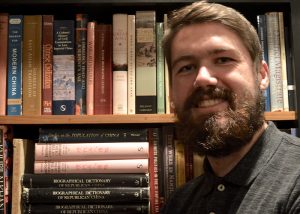Interested in pursuing a BA in Asian Studies? In this interview series, we ask our students about their experience in our program and their future academic and professional goals. This interview features fourth-year undergraduate student Aaron Throness, who will be graduating in May 2020. Aaron’s main academic interests are Mandarin and Classical Chinese; and Late Imperial Chinese History.


Tell us a little about yourself, your background and how you became interested in Asian languages and cultures?
I am a fourth-year undergraduate student nearing the completion of my BA in Asian Area Studies degree, with a specific focus on Late Imperial Chinese cartographic and coastal history. My first encounter with Chinese language and culture was many moons (thirteen years!) ago as a ten-year-old in elementary school. I quickly became friends with a newly immigrated Chinese student in my fifth-grade class, and as a matter of course became enamored with Mandarin Chinese as we spent more and more time together. It was through my exposure to this fascinating language that I naturally developed an interest in Chinese culture and history; in retrospect, what was really a coincidence in my youth completely changed the trajectory of my life!
Could you elaborate on an experience that you felt was fundamental in your acquisition of the language or appreciation of the culture?
An experience that deeply impacted my appreciation for Chinese culture was 12 years after my first encounter with Chinese language and culture, during my first visit to Beijing in May of 2018. Being an enthusiast of Late Imperial China, I made up my mind to visit the Temple of Heaven, a complex of religious facilities and structures frequented by Ming and Qing emperors when carrying out state sacrifices. During my early morning exploration of the site, I gazed with pure amazement into the Hall of Prayer for Good Harvests (the largest and most iconic building in the complex) and admired the intricacy and beauty of its construction. In my mind’s eye, I could see the emperors of China’s past praying earnestly before the altar just a few feet in front of me – it was in this profound moment of awe that I felt I had finally gained a true appreciation for traditional Chinese culture; experiencing it ‘in situ’ really served to validate the years of effort I had invested (and continue to invest) in the study of Chinese language, culture, and history.

What choices did you make at UBC that contributed to your success / journey?
First, staying up to date with the UBC Asian Studies Department’s opportunities has been one of the most important choices I made during my journey at UBC. It was through the department newsletter, for instance, that I learned of the North American Taiwan Studies Association’s undergraduate scholarship competition in early 2019 – I decided to participate, and my paper was fortunate enough to win first place! The Asian Studies Department offers a generous amount of academic and professional opportunities – all one has to do is take the initiative and get involved. Second, deciding to be an active participant in my education has been another key to success; I would encourage each and every student to make this choice. From something as simple as making sure to consistently raise my hand in class to studying Classical Chinese on my own time, deciding to not be a passive recipient, but rather an active facilitator in my education at UBC has allowed me to grow both academically and personally.
What are your current academic or career goals upon completing your program? How do you think UBC Asian Studies is helping you achieve these goals (or has helped you accomplish your goals)?
I aspire to pursue graduate studies in either Canada or the United Kingdom following my graduation in May of 2020. In my graduate studies I hope to build upon the research interests I have fostered at UBC by structuring my thesis around the intersectional relationship between developments in 16th century Ming coastal cartography and surges of piracy. If all goes according to plan for my Master’s, I hope to then pursue a PhD and thereafter a professorship.
The UBC Asian Studies department and its staff have been immeasurably supportive as I strive toward my academic and career goals. World-class faculty like Dr. Timothy Brook, Dr. Leo Shin, Dr. Diana Lary (Emerita), Dr. Josephine Chiu-Duke, and Dr. Clayton Ashton have all been incredibly generous with their time and support by pointing me in the right direction in my undergraduate work and by being mentors for my graduate school applications. The Asian Studies Library at UBC has also provided me with invaluable resources that have allowed me to pursue rigorous and in-depth research projects that would not have been possible otherwise. Lastly, the wide breadth of courses offered by the Asian Studies department has allowed me to broaden my horizons while simultaneously honing my focus. In a word, UBC Asian Studies’ faculty and facilities have been instrumental in helping me achieve my goals; I owe a tremendous debt of gratitude to those who have tirelessly supported me throughout my undergraduate years!
What can you tell students who are considering taking Chinese history, Asian Studies, or China related courses?
Asian Studies occupies a position of tremendous importance on the global stage, and no less ought to occupy a position of equal importance in academic communities like UBC. Whether one studies Asia’s extensive array of histories, its incredible cultural diversity, or its growing global economic impact, it becomes relevant in one way or another to each and every one of us. In the case of history, UBC’s Asian Studies program emphasizes tying together the themes, trends, and developments of the past with the contemporary Asian world; as I have found out for myself, China’s past exerts a remarkable influence on the trajectories of its current political decisions, cultural characteristics, and economic policies. UBC Asian Studies is thus important for those who seek to not only decipher the past and understand the present, but also for those who seek to gain insight into what lies ahead in the future.
For students considering taking courses in the Asian Studies department, I would say that going the extra mile is something to always keep in mind. Whether it comes to class participation, small assignments, or major research projects, always invest more than what is simply stated in the requirements! Studying Chinese history, or Asian Studies more broadly, becomes all the more rewarding when one decides to put in the extra effort.


